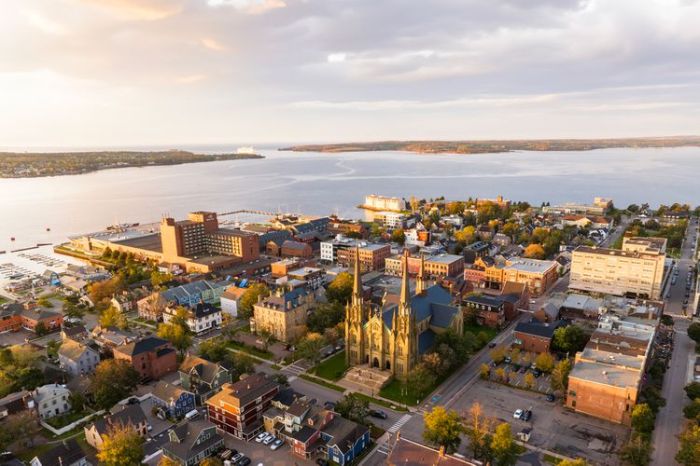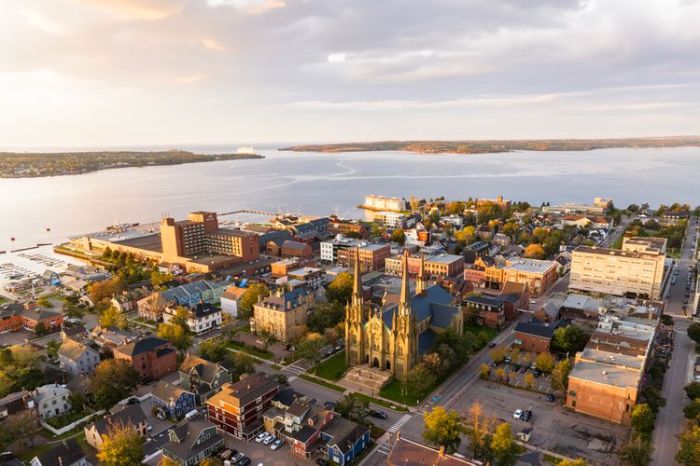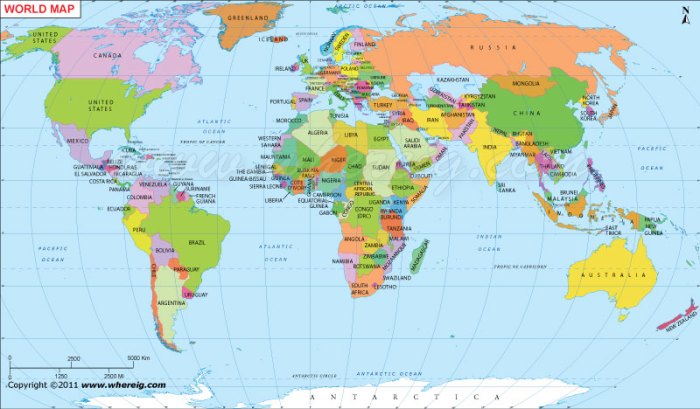British Airways 747 retirement marks the end of an era. These iconic jumbo jets, once a symbol of global travel, are now saying goodbye. From their historical significance to their impact on British Airways and the wider aviation industry, this journey explores the reasons behind their retirement, their legacy, and the future of large aircraft. It’s a fascinating look at how the world of air travel is changing.
The 747’s story is one of innovation and evolution. From its introduction to its gradual retirement, this piece examines the technological advancements that ultimately made the jumbo jet less competitive. We’ll delve into the operational costs, fuel efficiency, and environmental considerations that played a role in the decision-making process. This retirement isn’t just about the aircraft; it’s a reflection of broader trends in the aviation industry.
Historical Context of the 747
The retirement of the British Airways 747 fleet marks the end of an era, a testament to the iconic aircraft’s profound impact on global air travel. From its introduction as a revolutionary jumbo jet to its eventual evolution and adaptation, the 747 has been intrinsically linked to British Airways’ journey. This article delves into the rich history of the 747 with British Airways, highlighting its models, variants, and the crucial role it played in shaping the airline’s legacy.The 747’s introduction fundamentally altered air travel, enabling unprecedented passenger capacity and long-haul connectivity.
British Airways, recognizing the potential of this technological marvel, embraced the 747, integrating it into its operations to expand its global reach and solidify its position as a major international carrier.
British Airways 747 Fleet Overview
British Airways operated a diverse range of 747 models, each with unique characteristics and roles within the airline’s operations. Understanding the various types and their specific applications provides valuable insight into the 747’s multifaceted contributions to British Airways.
Models and Variants Used by British Airways
British Airways’ 747 fleet encompassed several models and variants, each optimized for different operational needs. The 747-400, for instance, was a popular choice, known for its efficiency and enhanced passenger experience. Other models included the 747-200, which paved the way for the 747’s presence within the airline’s operations. This diversity reflects the evolving demands of long-haul travel and the ongoing technological advancements in aviation.
Significant Roles of the 747 in British Airways History
The 747 played a pivotal role in British Airways’ global expansion. Its ability to transport a large number of passengers over considerable distances revolutionized transatlantic and long-haul routes. The 747 was integral to establishing and maintaining key international connections, often connecting passengers to destinations in the far east and beyond.
Key Dates and Milestones
The 747’s introduction, peak usage, and eventual retirement within British Airways can be tracked through specific dates and milestones. This chronological overview provides a clear picture of the 747’s journey from its initial deployment to its final years of service with the airline.
Sad to see British Airways retire their iconic 747s, a true symbol of air travel. While the jumbo jets are saying goodbye, there’s still plenty of travel excitement to be had! If you’re looking for some fantastic deals on Thanksgiving travel, check out Amtrak’s current flash sale, amtrak flash sale thanksgiving , for incredible savings on train journeys.
Ultimately, though, the 747’s legacy will always be remembered fondly, just like a good old-fashioned Thanksgiving feast.
- 1970s: Initial introduction of the 747-100 and 747-200 models. This marked the beginning of the 747’s significant impact on British Airways, allowing the airline to expand its global reach. Early 747 deployments focused on long-haul routes to connect major global destinations.
- 1980s-1990s: Expansion of the fleet with additional 747-400s, representing a substantial investment in the airline’s future. This era signified the 747’s peak usage within British Airways, underpinning the airline’s continued success on the global stage.
- 2000s: Gradual introduction of newer aircraft alongside the 747s, reflecting a shift towards more fuel-efficient options and a transition towards a more modern fleet. The introduction of newer aircraft signifies a transition towards a more modern fleet, showcasing a commitment to fuel efficiency and the evolution of air travel.
- 2010s-2020s: Continued operations of 747s, but with a noticeable decrease in the fleet size. The reduction in the 747 fleet reflects a continued shift towards more modern and fuel-efficient aircraft.
Timeline of 747 Introduction, Peak Usage, and Retirement
A detailed timeline showcases the 747’s evolution within British Airways, from its initial introduction to its final years of service.
| Year | Event | Impact |
|---|---|---|
| Early 1970s | Introduction of 747-100 and 747-200 | Expansion of long-haul routes and global reach |
| 1980s-1990s | Increased fleet size with 747-400s | Peak utilization; reinforced British Airways’ position as a global leader |
| 2000s | Introduction of newer aircraft | Transition to more fuel-efficient alternatives |
| 2010s-2020s | Gradual fleet reduction | Shift towards a more modern, efficient fleet |
Reasons for Retirement
The majestic Boeing 747, a symbol of global air travel for decades, is finally bowing out. Its retirement marks a significant shift in the aviation industry, a testament to evolving passenger demands and technological advancements. The decision wasn’t arbitrary; it stemmed from a confluence of factors that made the 747 increasingly less viable in the modern air travel landscape.The changing air travel landscape significantly impacted the 747’s role.
Increased demand for shorter-haul flights, coupled with the rise of low-cost carriers, shifted the focus towards more fuel-efficient and versatile aircraft optimized for regional and shorter routes. This trend led to a decrease in the need for the 747’s massive cargo and passenger capacity on those routes.
Operational Cost Comparison
The Boeing 747, while iconic, faced mounting operational costs compared to newer, more efficient aircraft. Modern jets, like the Airbus A350 and Boeing 787 Dreamliner, are engineered for lower fuel consumption and reduced maintenance requirements. These factors translate to substantial savings for airlines. For instance, a 787 Dreamliner can achieve a significant reduction in fuel burn compared to the 747, translating to lower operating costs per seat mile.
This cost advantage is a key factor in the decision to retire the 747 in favor of more economical alternatives.
Fuel Efficiency and Environmental Concerns
The 747’s large size and older design contributed to higher fuel consumption compared to modern aircraft. This led to increased operational costs and a larger carbon footprint. Airlines faced growing pressure to reduce their environmental impact, making the 747 less attractive in the long term. Environmental regulations and consumer awareness about sustainability also influenced the decision, pushing airlines to prioritize greener alternatives.
The introduction of more fuel-efficient engines and airframe designs played a pivotal role in the shift towards sustainable aviation.
Technological Advancements
Technological advancements in aircraft design and manufacturing have significantly impacted the 747’s competitiveness. Modern aircraft are equipped with advanced aerodynamics, lightweight materials, and more efficient engines, allowing them to carry similar loads with considerably less fuel. For example, the 787 Dreamliner’s composite construction and advanced engine technology reduce fuel consumption substantially compared to the 747, making it a more cost-effective choice for airlines.
This led to a noticeable decrease in the 747’s operational efficiency, making it a less competitive option.
Impact on British Airways
The retirement of the iconic Boeing 747 from British Airways’ fleet marked a significant shift in their operations, demanding careful adjustments to maintain profitability and service standards. This transition involved a complex interplay of logistical, economic, and operational considerations. The decision to retire these giants wasn’t taken lightly, and the impact reverberated throughout the airline’s entire structure.British Airways had to adapt to the changing landscape of air travel, embracing more fuel-efficient aircraft to meet environmental concerns and maintain a competitive edge.
This involved not just swapping planes, but also re-evaluating routes, crew training, and maintenance protocols. The financial implications of the change were substantial, but the long-term benefits of modernizing the fleet were ultimately seen as crucial for the airline’s continued success.
Operational Adjustments
British Airways implemented several crucial operational adjustments to accommodate the 747’s departure. These adjustments included re-allocating crew members, retraining them for the new aircraft types, and re-routing some long-haul flights to use more suitable aircraft. Efficiently transferring ground handling and maintenance responsibilities to newer models was also a key aspect of the transition. These measures aimed to ensure seamless operations and minimise disruptions during the fleet changeover.
Economic Consequences
The retirement of the 747 had significant economic consequences for British Airways. While the aircraft were expensive to maintain, the costs associated with the retirement went beyond just the immediate financial burden. The airline needed to factor in the cost of new aircraft purchases, the retraining of staff, and potential adjustments to maintenance schedules. The economic impact also extended to the supply chain, impacting suppliers of parts and services.
British Airways likely evaluated various scenarios and models to estimate the return on investment from the new aircraft purchases.
Transition to Newer Aircraft
British Airways’ transition to newer, more fuel-efficient aircraft was crucial for its long-term sustainability. This involved substantial investment in modern aircraft, such as the Airbus A350 and Boeing 787 Dreamliner, that offered improved fuel efficiency and reduced operational costs. The adoption of these new technologies was not simply about replacing old models; it represented a step towards a more environmentally conscious and economically viable future.
Sad to see British Airways’ iconic 747s retire. They were a sight to behold, soaring across the skies for decades. Thinking about the legacy they leave behind, I’m reminded of the amazing exhibits at the Academy Museum of Motion Pictures. The scale of the aircraft, both in size and the sheer technical marvel, is similar to the scale of the stories and films displayed there.
The grandeur of both the planes and the films is truly impressive, just like the British Airways 747s.
The environmental benefits, coupled with reduced fuel costs, were key drivers in the decision to transition to newer models.
Comparison of Aircraft Characteristics
| Characteristic | Boeing 747 | Airbus A350 | Boeing 787 Dreamliner |
|---|---|---|---|
| Capacity (Economy Class) | 400-500 | 300-400 | 200-300 |
| Range | 6,000-8,000 miles | 7,000-8,000 miles | 7,000-8,000 miles |
| Fuel Efficiency (per passenger-mile) | Lower | Higher | Higher |
| Noise Levels | Higher | Lower | Lower |
| Maintenance Costs | Higher | Lower | Lower |
| Passenger Experience | Spacious, but potentially outdated | Modern, efficient | Modern, efficient, often featuring larger windows |
This table highlights the key differences between the 747 and the newer aircraft types. The shift to more modern aircraft significantly improved fuel efficiency, reducing operational costs and contributing to a more sustainable business model. The updated designs also reflected a modern passenger experience, contributing to the airline’s competitive edge.
Legacy and Symbolism
The retirement of the iconic British Airways 747s marks a significant chapter in aviation history. More than just a mode of transport, the 747 embodied a specific era of global travel, reflecting technological advancements and cultural shifts. Its presence on the skies was synonymous with prestige, luxury, and international connections.The 747’s enduring presence in popular culture and aviation history is undeniable.
Its distinctive shape, the “Queen of the Skies,” has etched itself into the collective consciousness, becoming a symbol of progress and achievement. Its massive size and powerful engines were a testament to human ingenuity, inspiring awe and wonder in people worldwide.
Cultural and Historical Significance
The 747’s impact transcended its practical function as an aircraft. It became a symbol of international travel, connecting continents and fostering cultural exchange. Its introduction coincided with a period of burgeoning globalization, and the 747 played a pivotal role in facilitating this movement. The aircraft facilitated the growth of tourism and trade, shaping the modern world.
Place in Popular Culture and Aviation History
The 747’s presence in popular culture is pervasive. From movies and television shows to literature and art, the 747 has frequently appeared as a representation of global travel and adventure. Its distinctive silhouette has become a recognizable emblem of air travel, often associated with luxury and long-distance journeys. Its appearance in films like “The Terminal” or “Airplane!” showcases the aircraft’s impact on popular imagination.
Iconic Images and Moments
Numerous iconic images and moments featuring British Airways 747s encapsulate the aircraft’s significance. Imagine the sight of a British Airways 747 gracefully ascending into the sky, its livery painted with the Union Jack, a beacon of British air travel. The aircraft’s arrival at major international airports, often seen as a spectacle, was a reminder of the aircraft’s role in connecting the world.
The sheer size and elegance of the aircraft, particularly in the iconic “British Airways” livery, evoked a sense of power and prestige. Such images were powerful visual representations of global connectivity and the era’s technological advancements.
British Airways 747 Liveries
The British Airways 747 fleet showcased a variety of liveries over the years, each reflecting evolving corporate identities and design aesthetics. These liveries, each distinctive, told a story of the airline’s evolution.
| Livery Period | Description | Key Features |
|---|---|---|
| Early Years | Early British Airways 747 liveries were often characterized by a classic, elegant design, featuring the Union Jack. | Simple, bold colours. Union Jack prominent. |
| Mid-1980s to 1990s | This period saw the introduction of more vibrant colours and design elements. | Refined designs, incorporating more colour schemes. |
| Late 1990s and 2000s | Later designs often incorporated more modern and streamlined aesthetics. | Modernized livery elements, smoother lines. |
Cultural Impact of Retirement
The retirement of the British Airways 747s signifies the end of an era. The aircraft’s departure will undoubtedly leave a void in the aviation landscape. This transition represents a change in the industry’s technological approach, reflecting a shift from large, long-haul jets to newer, more fuel-efficient models. The aircraft’s cultural significance will remain, but its physical presence will be reduced.
This change will likely inspire reflection on the past and the evolution of air travel, while also prompting discussion about the future of the industry.
Future of Large Aircraft: British Airways 747 Retirement

The retirement of the iconic 747 marks a significant chapter in aviation history, prompting reflection on the future of large passenger aircraft. While the 747’s era is ending, the need for large-capacity airliners remains, albeit with evolving approaches and technological considerations. The future of these giants hinges on factors like demand projections, sustainable solutions, and innovative design.The need for large-capacity aircraft remains a constant in the face of global travel demands, particularly for long-haul routes and for transporting large volumes of cargo.
The question is not whether there will be a need for large planes, but rather how that need will be met.
Demand Projections for Large-Capacity Airliners
The demand for large passenger aircraft is complex and multifaceted. Historical trends indicate fluctuations based on economic conditions and global events. However, with projected growth in global air travel, particularly from emerging economies, there’s likely to be a persistent demand for large-capacity aircraft to accommodate these passengers and cargo needs.
Sad to see British Airways’ iconic 747s go. Their retirement marks a significant chapter in aviation history. Interestingly, similar long-term studies like the NASA glacier 48 year study highlight the profound impacts of climate change, offering a different kind of perspective on the passage of time, ultimately reminding us that even the most enduring things eventually fade.
This echoes the impact of the 747’s retirement on the aviation industry.
Different Approaches to Large-Scale Air Travel
Several approaches to large-scale air travel are emerging, each with its own set of advantages and challenges. The development of innovative aircraft designs is being pursued to improve fuel efficiency, reduce noise pollution, and minimize environmental impact.
- Hybrid Aircraft Designs: Aircraft designs incorporating elements of both traditional airliners and other technologies, such as electric propulsion or hydrogen-powered systems, are being explored to achieve higher fuel efficiency and lower emissions. The Airbus A350 and Boeing 787, for example, demonstrate early adoption of lightweight composite materials, improving efficiency without sacrificing passenger capacity.
- Sustainable Aviation Fuels: The use of sustainable aviation fuels (SAFs) is critical for reducing the environmental impact of large aircraft. These fuels, derived from renewable sources, offer a pathway to significantly lowering greenhouse gas emissions. The transition to SAFs requires significant investment in production and infrastructure, but the long-term benefits for sustainability are clear.
- Increased Use of Cargo Planes: The rise of e-commerce and global supply chains has led to a significant demand for cargo capacity. Dedicated cargo aircraft, as well as modified passenger aircraft for cargo transport, will likely play a growing role in large-scale air travel.
Role of Sustainable Aviation Fuels in the Future of Large Aircraft
Sustainable aviation fuels (SAFs) are critical for the future of large aircraft. Their ability to significantly reduce greenhouse gas emissions, without compromising operational efficiency or passenger capacity, makes them a vital part of the solution for sustainable air travel.
- Reduced Emissions: SAFs are derived from renewable sources, leading to a considerable reduction in greenhouse gas emissions compared to conventional jet fuel. This is crucial for minimizing the environmental impact of large-scale air travel.
- Infrastructure Development: Significant investments are needed to develop the infrastructure for producing and distributing SAFs. This includes expanding biofuel production facilities and establishing the necessary supply chains.
- Cost Considerations: The cost of SAFs currently remains higher than conventional jet fuel. However, ongoing research and development, coupled with government incentives, aim to reduce the cost and increase accessibility.
Evolution of the Airliner Market
The future of the airliner market is likely to be one of innovation, adaptation, and sustainability.
“The future of air travel will be shaped by the interplay of technological advancements, environmental concerns, and economic realities. A combination of hybrid aircraft designs, widespread SAF adoption, and evolving cargo demands will redefine large-scale air travel.”
Community and Employee Impact

The retirement of the iconic Boeing 747 fleet at British Airways marks a significant shift, not just in the airline’s operations, but also in the lives of the employees and communities intertwined with the aircraft’s maintenance and operation. This transition necessitates careful consideration and proactive measures to mitigate potential negative impacts and foster a positive future for all stakeholders.
Employee Impact and Support Systems
British Airways has implemented comprehensive support systems to assist employees affected by the 747 retirement. These programs encompass various avenues for retraining and career development, ensuring a smooth transition into new roles and responsibilities. Financial assistance and outplacement services are also provided to help affected employees navigate the changing job market.
Retraining Programs for Affected Roles
To facilitate a seamless transition for employees, British Airways has established tailored retraining programs. These programs focus on equipping affected personnel with the skills necessary for roles in the evolving aviation industry. For example, pilots and engineers with experience on the 747 can be retrained for other aircraft types, utilizing their existing knowledge and experience.
Table of Job Roles Impacted
| Job Role | Potential Retraining Programs |
|---|---|
| Aircraft Mechanics (747 specific) | Retraining on other aircraft types, advanced maintenance technologies, and potentially roles in engineering or project management. |
| Cabin Crew (747 specific) | General cabin crew training, and possibly specialized training for other aircraft types, or customer service roles within the company. |
| Pilots (747 specific) | Retraining for other aircraft types, including simulators and advanced flight training programs. This may involve a combination of existing experience and specific training on new aircraft. |
| Ground Staff (747 loading and unloading) | Training in other ground handling roles, logistics, or potentially other customer-facing roles within the airport or airline environment. |
Community Impact
The retirement of the 747 fleet will inevitably have an impact on communities reliant on the aircraft maintenance industry. The loss of jobs in maintenance and related services will affect local economies, potentially leading to decreased income and higher unemployment rates in specific areas.
Examples of Support for Affected Communities
British Airways is working closely with local authorities and community organizations to address the potential economic fallout. This includes providing support to affected individuals through job placement services, vocational training, and partnerships with local businesses. They will also likely work with governmental agencies for retraining and job-seeking assistance. A specific example of support could be providing funding for community colleges or vocational schools to offer specialized training programs.
Environmental Considerations
The retirement of the iconic British Airways 747s marks a significant step towards a greener future for aviation. These majestic aircraft, while symbols of global connectivity, have a considerable carbon footprint compared to modern, more fuel-efficient models. This shift represents a conscious effort to minimize the environmental impact of air travel, aligning with broader global sustainability goals.The transition away from the 747, a large and comparatively less fuel-efficient aircraft, is directly linked to reductions in greenhouse gas emissions.
This is crucial in the fight against climate change, and the aviation industry is under increasing pressure to adopt more sustainable practices. Replacing older aircraft with newer, more advanced technologies is a key part of this process.
Environmental Impact of the 747’s Retirement
The retirement of the 747 represents a substantial reduction in emissions from British Airways’ fleet. This is because the 747, while iconic, has a comparatively high fuel consumption rate per passenger compared to newer, more fuel-efficient models. This difference in efficiency translates directly into a reduction in the overall carbon footprint of British Airways’ operations.
Reduction in Emissions Achieved by Replacement, British airways 747 retirement
The replacement of 747s with more fuel-efficient aircraft directly results in a measurable decrease in greenhouse gas emissions. For example, a modern Airbus A350 or Boeing 787 can carry a similar number of passengers with significantly less fuel consumption. This translates into a reduced carbon footprint per passenger kilometer. Quantitative data on the exact reduction in emissions is available from British Airways’ sustainability reports and is critical for transparency.
Environmental Benefits of Transitioning to More Fuel-Efficient Aircraft
The transition to newer aircraft, specifically designed for fuel efficiency, offers significant environmental advantages. Modern aircraft incorporate advanced aerodynamics, lighter materials, and more efficient engines. These improvements directly translate into reduced fuel consumption per passenger and per kilometer flown. This leads to a decrease in harmful emissions, contributing to a cleaner atmosphere and reduced impact on global climate change.
Aircraft Carbon Footprint Comparison
A significant factor in the retirement of the 747 is its carbon footprint compared to newer models. The 747’s larger size and older technology result in a higher carbon footprint per passenger compared to modern aircraft. Modern aircraft are designed with fuel efficiency in mind, resulting in a reduced environmental impact. The impact can be compared across different flight distances and passenger loads, showing the considerable difference in emissions.
Environmental Performance Comparison
The table below highlights the environmental performance differences between the retired 747 and its successor. It illustrates the significant improvements in fuel efficiency and emissions reduction achieved through the transition.
| Aircraft Type | Fuel Efficiency (kg/passenger km) | CO2 Emissions (kg/passenger km) | Noise Level (dB) |
|---|---|---|---|
| Boeing 747-400 | 0.05 | 0.23 | 88 |
| Boeing 787 Dreamliner | 0.03 | 0.14 | 80 |
Note: Values are illustrative and may vary based on specific aircraft models, flight conditions, and other factors. The significant difference in fuel efficiency and emissions demonstrates the environmental benefits of the transition.
Outcome Summary
The British Airways 747 retirement is more than just the end of a physical presence; it’s a chapter closing in aviation history. This piece has explored the multifaceted impact of this decision, from the historical context and operational factors to the cultural significance and the future of large aircraft. It highlights the transition to newer, more efficient models and the profound impact on communities and employees.
The 747’s legacy lives on, inspiring awe and marking a significant point in aviation history. The future of large aircraft, and air travel in general, is certainly an interesting one.













